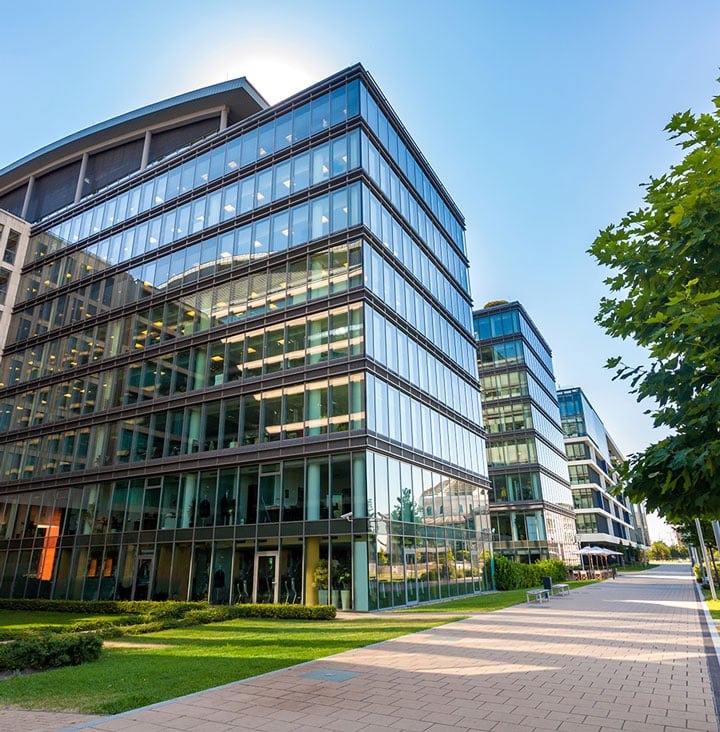Today’s property operators are under constant pressure to ensure tenant satisfaction amid an ever-fluid commercial retail estate landscape and technological era characterized by rapid innovation.
Among the most pressing issues facing commercial property managers is in-building cellular connectivity—for good reason. Most workers today leverage various devices for their day-to-day routines, and those tools are useless without a proper—and robust—cellular connection. Without a doubt, property operators are keenly aware of the necessity to modernize wireless technologies, especially with the 5G revolution banging at our collective doorstep. And it doesn't help that the cellular service offered by major carriers is on the decline.
Meanwhile, workers increasingly blame technology—or the in-building digital infrastructure that supports it—for collapsed deals or unsuccessful meetings.
- 30% of people said poor cellular connectivity was the reason they lost out on a deal or client, among other business-related problems
- 51% reported experiencing interruptions during their workday because of poor connectivity
The numbers don’t tell the entire story, either. Perception, as the saying goes, is reality—meaning an issue experienced by a few loud commercial tenants can quickly escalate into a broader problem.
From their perspective, effective communication is foundational to business success. It improves employee productivity, engagement, and innovation, and fosters better customer satisfaction. In a globalized and ever-changing business landscape, communication is key for adaptability and maintaining a positive brand reputation. If your property commits to strengthening cellular connectivity, it can improve relationships with current customers and generate enthusiasm among prospective tenants.
Now more than ever, clear, uninterrupted communication is integral to business success—for you and your customers. Cellular Enhancement Systems, and other solutions, go a long way in improving tenant satisfaction, occupancy levels, and property values.
Why Commercial Properties Have Poor Cellular Connections
If your building suffers from poor in-building cellular connectivity, you’re not alone. It’s a common issue that impacts properties of all sizes, including commercial offices, hospitals, academic institutions, and much more.
While the reasons vary, people often contend with poor connections because of building materials, size and layout, cell tower distance, poor weather conditions, and, unsurprisingly, too many users simultaneously accessing a network.
Although the occasional storm, dense fog and network overload are elements that are out of property managers’ control, construction materials, in theory, can be modified to improve cellular connection. However, that’s most likely to be the case at the outset of a project or during a large-scale renovation. Everything from concrete and drywall to fiberglass and metals acts as a physical barrier, pounding cell signal strength, and frustrating tenants.
Of course, Wi-Fi offers a clear, easy, and necessary solution, but today’s workforce requires powerful redundancies, especially as people increasingly rely on mobile devices for video conferencing, standard phone calls, and multitasking. Providing layered solutions is no longer a convenience but a necessity. And it allows you to build the core infrastructure that provides greater agility as you future-proof properties ahead of inevitable technological upgrades.
To underscore how critical a strong signal is to everyday activities, a study out of the United Kingdom found that small businesses lost the equivalent of $20 billion due to unsatisfactory reception.
Advantages of Reliable Cellular Connectivity
Today’s workforce requires various tools to ensure efficient communication, maintain productivity, and drive business success.
And as more and more workers return to the physical workspace, there’s an expectation that everything they need to support their day-to-day activities will be easily accessible—and that includes reliable cell service.
Cell Phone Reception Isn't Great. We Can Make it Better.
As this Time magazine article aptly puts it, "you're not imagining" the decline in cell phone reception.
According to the piece:
"On average, between April and June of 2023, U.S. cellphone users reported that out of every 100 times they tried to use data, text, or make a call, they had problems 11 times. That’s up from about nine problems per 100 connections in most of 2020 and 2021, according to a report from J.D. Power." (Emphasis added)
Imagine any other core piece of your day-to-day life that suffered an 11 percent failure rate.
This is a very real problem that is impacting major carriers, all of whom scored worse, according to the J.D. Power report, in 2023 than in 2021.
As consumers, we're constantly told that technology is improving, and our lives will collectively be made better as a result. But that's certainly not the case when it comes to declining carrier coverage.
Luckily there is a solution. With Airtower's state-of-the-art technology, you can boost cellular connection inside your building so your tenants don't have to rely solely on their personal carrier. That's not just nice to have—it's a selling point for why a prospective tenant should choose your building over a competitor.
Future-Proofing Commercial Properties
As property managers survey the landscape, it’s clear that future-proofing buildings and outfitting them with the latest technology is critical. That means preparing your property for the transition to 5G technology, which promises to revolutionize how people do business. It also means improving existing technology, such as cellular service, to ensure seamless business operations.
Tenants, especially those in fiercely competitive industries, are always looking for an advantage. Having a robust technological infrastructure, combined with Cellular Enhancement Systems, is one way to get there.
There’s also increased demand for smart building technologies, which support everything from HVAC systems and lighting to security cameras and door locks.
Creating in-building solutions that are scalable and flexible allows for easier integration of future technologies, laying the groundwork for a level of adaptability that ensures commercial properties can evolve with the changing landscape of cellular connectivity.
Improved Tenant Satisfaction
From a customer experience point of view, there are myriad benefits of reliable cellular connectivity:
Seamless Communication: Most businesses are no longer tied to their geographical location. That means maintaining direct and clear communication with clients wherever they may be is critical.
Greater Productivity: You’ve likely heard the term “digital natives,” which refers to a large swath of the population that knows nothing of the pre-online world. Well, think of today’s workers as mobile natives—people who are accustomed to performing key functions on multiple devices, whether they’re tethered to their devices, roaming the office, or operating remotely. A survey of 1,500 workers found that mobile devices, including tablets, made 62% of respondents more productive at their jobs—an impressively high number.
Improved Collaboration: Again, in an interconnected environment, collaboration is key. While many workers are returning to the office setting, others remain remote or find value in a hybrid schedule. Whatever the case, people are required to communicate and collaborate for various projects throughout the day, making reliable cellular connectivity vital to a business's operations.
Be on the Cutting Edge of the Mobile Takeover
Outfitting your property with the latest and most advanced cellular technology could be the competitive advantage you’ve been looking for.
Mounds of research show that mobile devices are becoming more and more ubiquitous, especially among key demographics.
For example, millennials, who represent 35 percent of the US workforce, are considered high-end mobile users.
And 55 percent of employees say they prefer to use their cell phone rather than a desk phone for business calls, underscoring the importance of having strong cellular connectivity.
Corporations today, even those that lack the biggest budgets, are investing in collaborative and communication technologies for all the reasons we stated above—and to stay ahead of the competition themselves.
Cellular Connectivity Solutions for Modern Commercial Buildings
As we mentioned, some of the biggest impediments to reliable cell service within commercial properties are construction materials. At the same time, cellular service from major carriers is not as reliable as it was just a few years ago.
At Airtower Networks, we’re well aware of the need to improve connectivity across buildings and industries. As for commercial properties, one of the best ways to establish stronger connections and reduce interruptions is by installing outdoor cellular towers inside buildings.
Our expertly trained team works with property managers to identify areas of improvement, understand their tenants’ needs, and create a plan to not only improve cell service but enable 5G and outfit buildings for future upgrades, including in-building smart infrastructure.
Ensuring a strong and uninterrupted cellular connection within commercial properties goes beyond just considering the technology involved—it is a strategic investment that has a significant positive impact on various aspects of business operations and tenant satisfaction.
Airtower Networks offers tailored solutions including cellular, managed WiFi, private LTE, and more to ensure flawless connectivity within buildings, boost productivity, and drive a competitive advantage. Connect with us today to transform your commercial property into a first-class business destination.
Subscribe to the Airtower Networks Blog
Get emailed articles, guides, and updates.




